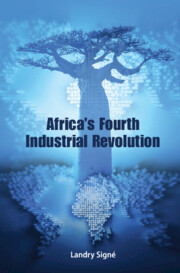This commentary is part of the Africa’s Fourth Industrial Revolution blog series. Read the related book on Africa’s 4IR here.
Despite the prevailing narrative that Africa is falling behind in the Fourth Industrial Revolution (4IR), the continent is actually home to half of the world’s mobile money accounts, making it a pioneer in integrating 4IR technology into the financial services industry, according to 4C Group and GSMA. As numerous African-led innovations prove, and as I argue in my book Africa’s Fourth Industrial Revolution, advanced technologies have already provided and continue to offer unprecedented opportunities for the continent to improve business performance and connect millions of unbanked people to financial services.
Leapfrogging into the 4IR
Despite Africa’s slower rates of internet penetration compared to the rest of the world, it is leading the way in other key areas of digitalization, including in the financial industry, indicating that there may be important leapfrogging opportunities available.
Africa is home to more than half of the world’s registered and active mobile money accounts (800 million), and in 2023 sub-Saharan Africa was home to almost three-quarters of the world’s accounts and was the source of 70% of the growth in registered accounts. This uptick is in part due to the successful increase in mobile phone subscriber penetration, which outpaces broadband expansion and reached 43% in 2023, with mobile phones accounting for three-fourths of total online traffic in Africa. Mobile money increased GDP in the region by more than $150 billion between 2012-2022 (3.7%). This has led to a robust fintech sector on the continent with lucrative opportunities for the future—according to McKinsey, fintech is expected to reach $400 billion globally by 2028.
A key leapfrogging opportunity lies in digital banking and payments. Approximately 90% of all financial transactions in Africa are conducted using cash and coins. Only 2% of Senegal’s population, for example, used a debit card as of 2022, and reliance on cash remains strong meaning there is great opportunity for these countries to leapfrog directly to digital payments.
The impact of advanced technologies
To facilitate such leapfrogging, advanced technologies are leading the way, with ample African-led innovations entering the financial services market.
AI tools are helping customize financial services, from tracking financial transactions to investments and lending. These tools can help personalize services for customers in Africa and thus bring more people into financial services. The size of Africa’s population and number of interactions with digital financial services gives the continent an edge over other regions, since the high volume of data can help train new and existing algorithms faster, according to Sehrish Alikhan of Finextra.
Blockchain, which increases the transparency and security of financial transactions, is helping power cross-border payments and decentralized lending. It also dramatically cuts the costs of digital financial transactions and builds trust, which is critical for African fintech.
IoT is also at work in the financial sector. For example, M-KOPA, a Kenyan digital financial services company, has integrated advanced IoT technologies into its digital micropayments service, improving processing speed to 500 payments per minute and reaching 3 million people across the continent. The company uses Microsoft’s AI services to forecast and manage financial risk, allowing it to reach millions of unbanked and underbanked Africans and provide them with loans for purchases such as solar lighting, smartphones, refrigerators, and more.
New areas for growth and outlooks
African-led companies are also expanding into new areas of financial services, recognizing ripe opportunities to use advanced technologies in novel ways.
Regulation technology or “regtech” is the use of advanced technologies to design new regulatory tools and enhance regulatory processes, including using AI to monitor data for regulatory data, using blockchain to track and verify compliance data, and using natural-language processing to help organizations understand regulatory requirements. RegTech is becoming an area of interest on the continent and in Nigeria, for example, is expected to see a 40% increase by 2026.
Cryptocurrencies are also increasing in popularity in some parts of the continent. In 2023, Nigeria was ranked #2 in the Global Crypto Adoption List, behind India and ahead of the United States. The continent is even leveraging AI to create a new digital currency—the LUMI A.I. Commemorative Coin. One LUMI is backed by 100kWH of solar energy—equivalent to 4 grains of gold—and has gained increasing legitimacy, especially as digital economy platforms such as Swiffin/HanyPay have started to use it. AI is embedded in the currency’s digital coin, making transactions more efficient and secure through advanced encryption methods and allowing it to be integrated into digital platforms including mobile wallets and online banking systems.
Fully digital banks, or neobanks, are also starting to emerge as potential players in the industry. South Africa’s TymeBank made its first monthly profit (a challenging mark for neobanks to reach) in December 2023, according to African Business, signaling that it could become more of a player in the years to come.
Challenges and strategies
These innovations within the financial services sector are showing local and global investors that advanced technologies will continue to change the game in the African market. Despite impressive progress, challenges remain. Millions remain unbanked across Africa, in particular women, according to Leora Klapper at Brookings, which means significant efforts must be made to ensure full financial inclusion.
Although a number of strategies will be required to overcome these challenges, three are of particular importance.
First, African countries must provide an agile regulatory environment that both enables innovation and protects citizens. The approach will likely differ in each country based on its unique context. For example, as research from the Carnegie Endowment for International Peace explains, Kenya has used a “test and learn” approach which helped M-PESA, Kenya’s successful mobile money service, pilot and scale. Nigeria, in contrast, for the most part follows a “banking-led model,” and the Central Bank of Nigeria has played a leading role in prohibiting and approving mobile network operators from operating within mobile money services. Zimbabwe, meanwhile, has found success using fintech regulatory sandboxes, which provide companies with an experimental approach to better understand how regulations may affect them. The speed and scale at which advanced technologies are being developed and deployed across industries makes it necessary for African countries to move away from old methods of regulation that are often more reactive than proactive. To do so, countries should look at the experience of their African counterparts and think strategically about how their unique business dynamics and overall context might best be supported by different and more agile forms of regulatory environments.
Second, African countries should better integrate advanced technologies to improve regulatory environments. RegTech offers tools for countries to experiment with a new way of thinking about regulation—one that uses a performance-based approach to standardize, automate, and streamline processes. By integrating various regtech applications, from machine-readable code that automates the processing of new regulations to image recognition that verifies identities, African countries can successfully identify their best course of action while continuing to adapt at speed as technology advances in their country. The World Economic Forum suggests asking three questions to better analyze what type of technology solution might be the most suitable for a country or company’s unique situation. These questions are: 1. What frictions exist in the regulatory process? 2. What is the nature of these frictions? 3. What processes could be improved to remove such frictions? These questions can help stakeholders identify entry points into the regtech arena and start the important process of integrating technologies into African regulatory ecosystems.
Third, African countries need to build trust through enhanced cybersecurity infrastructure, which will be key to expanding 4IR technologies throughout the financial services sector. Fraud and cyber threats have become increasingly prominent, with the financial services sector being the top sectoral target for cyberattacks in 2022-2023. For example, in South Africa, a data breach of millions of citizens’ social security information led to the creation of fake financial offers. To reduce the potential consequences of such data breaches and other cybercrimes, African governments need to focus on strengthening their cybersecurity infrastructure. To do so, African governments, financial institutions, and companies must work together to allocate resources for building defenses against cyber threats, including encryption tools, threat detection systems, endpoint security solutions, and training for employees and customers. Collaboration and proactive measures will be key to direct investment and regulatory harmonization toward building a resilient cybersecurity ecosystem.
Overall, African-led innovation within the financial services industry is catapulting the continent to the forefront of the industry, with important implications for digital inclusion and economic growth on the continent. As African countries continue to innovate, African governments and relevant stakeholders must focus on finding the right regulatory balance, integrating advanced technologies into their regulatory frameworks, and fortifying their cybersecurity infrastructure in order to further solidify their leadership role within the industry.
The Brookings Institution is committed to quality, independence, and impact.
We are supported by a diverse array of funders. In line with our values and policies, each Brookings publication represents the sole views of its author(s).





Commentary
Transforming the financial services sector in Africa with 4IR technologies
November 22, 2024